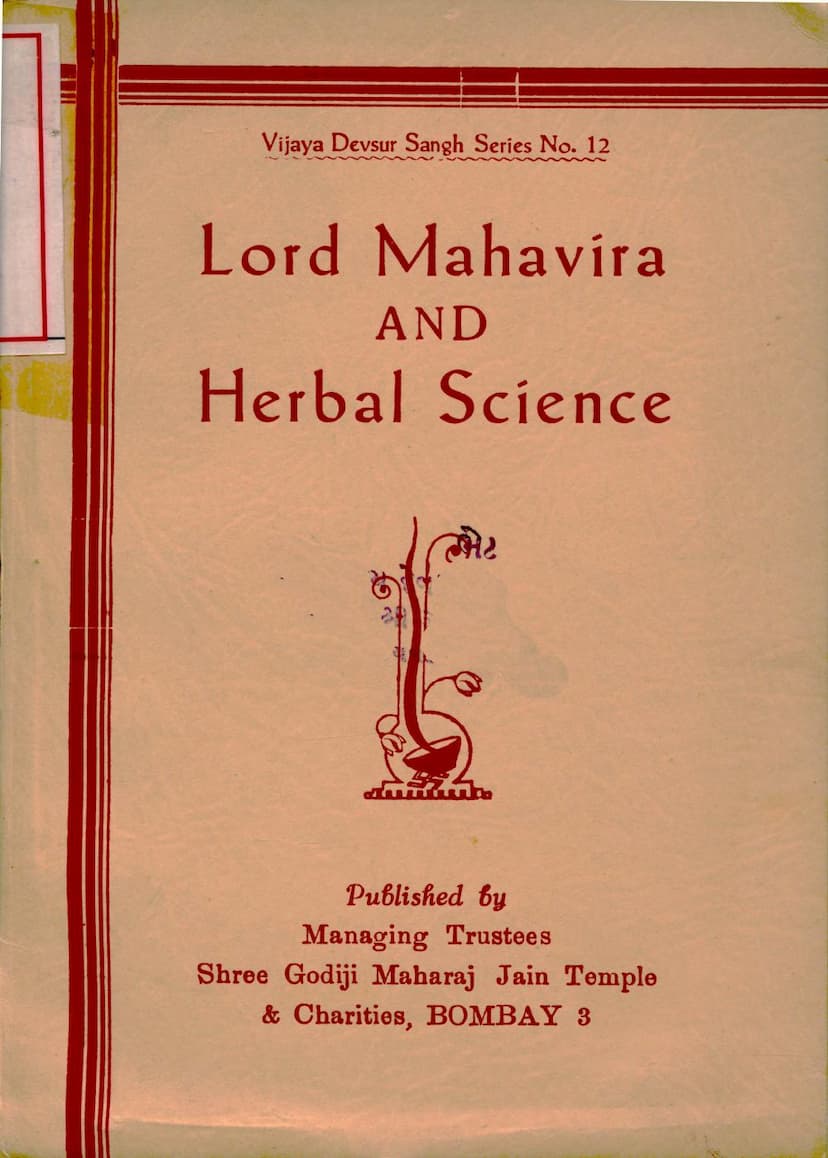Lord Mahavira And Herbal Science
Added to library: September 2, 2025

Summary
Here's a comprehensive summary of the Jain text "Lord Mahavira And Herbal Science" by Darshanvijay and Ghanshyam Joshi, based on the provided pages:
Core Argument:
The primary purpose of this book is to refute the claim that Lord Mahavira consumed meat. The authors argue that this accusation, particularly stemming from the work of Shree Dharmanand Kaushambi, is based on misinterpretations of ancient Jain texts, specifically the Bhagavati Sutra. They assert that Lord Mahavira was a staunch advocate and practitioner of ahimsa (non-violence) in thought, word, and deed, and that any mention of "meat" in the scriptures, when properly understood within its historical, linguistic, and medical context, actually refers to medicinal herbs, fruits, or preparations thereof.
Key Points and Supporting Arguments:
-
Refutation of Misinterpretations:
- The book directly challenges the allegations made by scholars like Shree Dharmanand Kaushambi, who claimed Lord Mahavira was a meat-eater.
- The authors attribute these claims to "immaturity" in scholarship of Prakrit language and Jain philosophy, leading to "wrong interpretations."
- They categorize such literature as "poisonous" and detrimental to the principles of Truth and Non-Injury.
-
Focus on Bhagavati Sutra (15th Shatak):
- The central piece of evidence discussed is a passage from the Bhagavati Sutra describing an instance where Lord Mahavira was suffering from a bilious fever, dysentery, and internal heat.
- The passage mentions a lady named Revati preparing something for him. The crucial words in question are "duve kavoya sarira," "majjar kadae kukkuda mansae," and "pariyasie."
- The book meticulously analyzes each of these words to demonstrate their non-meat, herbal, or fruit-based meanings.
-
Linguistic and Contextual Analysis of Key Terms:
- "Kavoya" (कवोय): The authors argue that "Kavoya" does not refer to a pigeon or bird, but rather to a vegetable or fruit, specifically Kushmanda (pumpkin) or Bijora (citron). They provide extensive lists of Sanskrit and Prakrit words with multiple meanings, showing how terms associated with animals can also denote medicinal herbs or plants.
- "Sarira" (शरीर): This word, used in conjunction with "Kavoya," is interpreted not as a body part of a bird, but as a preparation or jam made from the fruit. The masculine gender of the word is highlighted as significant, indicating a preparation rather than flesh.
- "Duve" (दुवे): Meaning "two," this refers to two preparations or types of the Kavoya fruit.
- "Uvakkhadiya" (उवखडिया): This word means "preparation" and is not associated with meat meals in Jain scriptures.
- "Majjar" (मज्जार): This refers to a substance that creates a cooling effect, useful for burning sensations and heat, possibly a specific medicinal herb (like Bidalika or a variety of Marjar).
- "Kadae" (कडए): Meaning "prepared from," this indicates the preparation of a dish.
- "Kukkuda" (कुक्कुड): While often meaning "cock" or "chicken," the authors demonstrate that in medical and botanical contexts, it can refer to a type of vegetable or herb (like Chaupattiya Bhaji) or the Bijaura fruit.
- "Mansae" (मंसए): This word, crucially, is shown to have a dual meaning. While it can mean "meat," in the masculine gender (as used here), it signifies the pulp or jam of a fruit, especially in a medicinal context.
- "Pariyasie" (पारियासिए): This means "preserved for a long time," a quality applicable to fruit preparations like Bijora jam, not to meat.
-
Medical and Ayurvedic Context:
- The book heavily relies on Ayurvedic texts and medical dictionaries to support its interpretations.
- It explains that Lord Mahavira was suffering from bilious fever and internal heat.
- Ayurveda recommends cooling substances like pumpkin (Kushmanda) and citron (Bijora) for such conditions.
- Conversely, meat is described as "hot, heavy in digestion, and stimulates Blood Dysentry," making it unsuitable and even harmful for Lord Mahavira's ailment.
-
The Role of Sage Sinha and Revati:
- Sage Sinha, an ascetic observing strict non-violence, was sent to fetch the medicine. The fact that he, a follower of Mahavira, would procure meat is deemed absurd.
- Revati, an ideal Jain lady observing vows, would not offer meat, especially for a spiritual leader. Her charity in preparing the medicine is even associated with earning Tirthankar merit.
-
Jain Principles and Practices:
- The book emphasizes that Jainism strictly forbids non-vegetarian diet, and its followers adhere to the minutest principles of non-violence.
- Numerous quotes from Jain scriptures (Acharanga Sutra, Sutra Krutanga Sutra, Bhagavati Sutra, Sthananga Sutra, Uttaradhyayana Sutra, Dashavaikalika Sutra) are cited to highlight the prohibition of meat consumption and its sinful nature.
- The usage of the word Ahimsa is presented as synonymous with the Jain religion, underscoring Mahavira's non-violent life.
-
Conclusion:
- The authors conclude unequivocally that Lord Mahavira consumed a preparation of Bijora jam (Bijora Pak) on medical grounds to cure his burning heat and bilious fever.
- They assert that any interpretation of the scriptural terms as referring to meat is a "grave error" and an "abuse of literature."
- The book aims to establish this fact clearly both in India and globally, thereby upholding the true principles of Jainism and Lord Mahavira's teachings.
In essence, "Lord Mahavira And Herbal Science" is a scholarly defense of Lord Mahavira's dietary practices, employing linguistic, contextual, and medical analysis to reinterpret ancient Jain texts and refute claims of meat consumption, firmly establishing his identity as a symbol of ahimsa and herbal medicine.